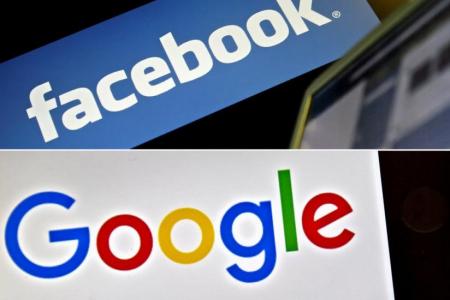Google, Facebook losing ad power?
Ad giant WPP's falling revenue, rising regulatory concerns could prove to be canaries in Google, Facebook gold mines
The shock results of advertising juggernaut WPP could prove to be the canaries in the Google and Facebook gold mines.
WPP's revenue has slipped, and concerns about its outlook have sent its share price sliding; its stock is down 25 per cent from its March peak.
The question is whether Google and Facebook will choke from poorer advertising results and regulatory concern about their growing monopolistic power.
In the past few years, the shares of these two giants have been gold dust for investors, and have outperformed bullion by a sizeable margin. Such has been their strength and popularity among institutional and individual shareholders that their combined market capitalisation has soared to US$1.2 trillion (S$1.6 trillion) - nearly in line with individual gross domestic products (GDP) of Russia, Spain and Australia, and exceeding the GDP of Mexico, Indonesia, Turkey, the Netherlands, Switzerland and Saudi Arabia.
Size is the worry as it comes with power and the need to satisfy a growing shareholder base with rising revenues and profits. Despite corporate claims, Facebook and Google are technology companies, but their main source of revenue is advertising.
Mr Martin Sorrell, head of WPP at last week's corporate results meeting, said: "Google and Facebook do have a duopoly in the digital media."
He said they account for nearly a third of the global digital market and about 20 per cent of worldwide media. Google and Facebook can thus be regarded as media companies directly in competition with TV, radio, newspapers and magazines.
The other aspect of the Google and Facebook duopoly is that they are effective utilities; they service communities with communication possibilities, privacy issues and information.
Facebook has more than 2 billion users on its platform; Google's YouTube has 1.5 billion. They, therefore, have the responsibility to control the placement of automated adverts from large and small companies and individuals.
After a scandal in March of placements on websites and pages that promote terrorism, violence and bigotry, both companies vowed greater controls. Large corporate names were alarmed about the placements and several withdrew advertising in early summer.
ADS TRANSLATING?
It has become common knowledge in the industry that companies are examining whether their ads on the giants translate into purchases.
A marketing specialist said in The Wall Street Journal: "At one time, I was an auditor at a media company that facilitated targeted ad campaigns on Facebook.
"We asked how agencies measured the success of each campaign and how they justified the ad spend to their clients.
"Apparently, creating 'brand awareness' in the 'new social media order' was the imperative, although the implied relationship between number of views or clicks or likes and product sales always seemed dubious to me."
Another concern is that companies are stifling creativity and competition from smaller rivals. They are either copying innovation or acquiring competitors.
Mr Jonathan Taplin, a digital media specialist, said: "The enormous profits that have come with this concentration of power tell their own story. Since 2001, newspaper and music revenues have fallen by 70 per cent; book publishing, film and television profits have also fallen dramatically.
"Revenues at Google in this same period grew from US$400 million to US$74.5 billion. Google's YouTube today controls 60 per cent of the streaming audio business and pays only 11 per cent of the streaming audio revenues. More creative content is being consumed than ever before, but less revenue is flowing to creators and owners of the content. If you think this is a problem only for musicians or journalists, you are wrong.
"With the re-allocation of money to monopoly platforms comes a shift in power. Google, Facebook and Amazon now enjoy political power on par with Big Oil and Big Pharma, which makes finding solutions to this problem even more difficult."
So far US regulators have not followed the European Union, which fined Google US$2.71 billion, saying its search engine favoured its own comparison-shopping service over others. Google has said it disagrees and will consider an appeal.
Meanwhile, Japanese and South Korean watchdogs are reportedly looking at the collection and use of data by Google and Facebook to see whether they have a monopoly over consumer web-surfing and online-buying data.
The writer is a journalist who writes on subjects including commodities, futures markets and mining. This article appeared in The Business Times yesterday.
Get The New Paper on your phone with the free TNP app. Download from the Apple App Store or Google Play Store now



